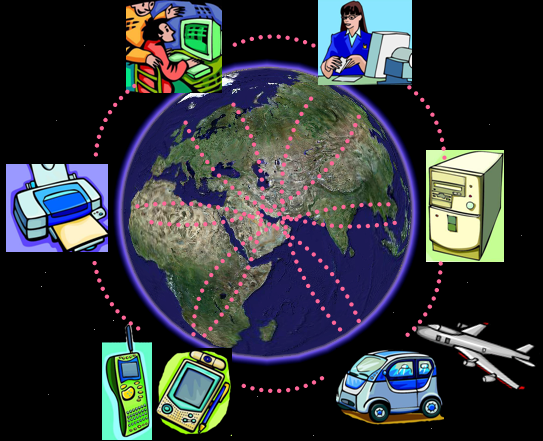What is the World Wide Web Consortium?
- W3C as an International Organization
- Mission, Structure
- Process, People
- Expanding Global Participation
- Web Technologies
Mission: Leading the Web to its Full Potential
Founded by Web inventor Tim Berners-Lee in 1994, W3C
is:
- Providing the Vision to Lead.
- Engineering the Standards that Make the Web Work.
 |
- From a Web of Documents ...
- ... toward One Web:
- of Information and Services
- on Everything
- for Everyone

|
(Membership / Benefits
/ New "At a Glance"
brochure)
Organization: International Web Standards Body
Expanding base of international operations
Process: Developing Standards at W3C
- Standards => Interoperability
- Consistent architectural framework: Architecture of the World Wide Web
- Clear and effective Process: Coordination, consensus,
interoperability
- Member-neutrality: All Members have
equal rights
- Engineer dependencies (inside and outside of W3C)
- 40+ Liaisons with other
international standards bodies
- Industry-leading Patent Policy:
Royalty-free licensing commitment
- New Incubator Activity
- Quicker, lighter process for innovative efforts
- Opportunity for work in non-English languages
(Views of the Process: Life of Working Group, Recommendation Track)
People: International Leadership and Cooperation
Expanding base of the world's leading technology organizations and
technologists

W3C Membership by Country (Apr
2006)
Who are W3C's Members?
"Third-class companies make products; second-class companies
develop technology; first-class companies set standards."
- W3C's Members includes
...
- most of the world's leading IT companies
- other large and small companies
- academic and research institutions
- government agencies
- non-profit organizations
- ... which are ...
- developing Web-based products
- using Web technologies
- conducting research on the Web
- developing specifications built upon W3C's work
* popular saying in Chinese business and
government, from "China’s Post-WTO
Technology Policy: Standards, Software and the Changing Nature of
Techno-Nationalism", by Richard P.
Suttmeier and Yao Xiangkui.
Case for Expanding Global Participation
- Web standards that are better, because they
...
- are based on global requirements and experience
- are more broadly interoperable, higher quality

- Web standards that are more widely deployed,
because they ...
- meet global requirements
- are better understood by global experts
- Greater opportunity for
everyone, through ...
- improved communication, understanding, innovation, commerce,
productivity
- development of Web-based products and participation in expanding
markets
W3C Actions to Expand Global Participation
- W3C works to be and must be
"World Wide"

- Recent actions to accelerate this drive include:
- Adding to W3C's 16 Global Offices
- Establishing new liaisons with int'l standards bodies, gov'ts,
companies
- Extending materials, symposia, etc. in multiple levels and
languages
- Reduced financial barriers to Membership
- Small companies, not-for-profits in China = 1,905 USD/yr
- Others between 6,3500 to 63,500 USD
- Reducing financial and non-financial barriers to
participation
- Mitigate effects of language, jargon, time zones, time
commitments, travel
Importance of China's Participation (2005 statistics)

Role of W3C's Offices in China and Elsewhere
 “To promote adoption of W3C recommendations among
developers, application builders, and standards setters, and to encourage
inclusion of stakeholder organizations in the creation of future
recommendations by joining W3C”
“To promote adoption of W3C recommendations among
developers, application builders, and standards setters, and to encourage
inclusion of stakeholder organizations in the creation of future
recommendations by joining W3C”
China Office: Advanced
Computing Technologies, School of Computer Science & Engineering of
Beihang University; Manager: Prof. Huai Jinpeng
- Primary hub of contact in the region, with ...
- Government, public and press, current and prospective Members
- Focus of activities in the region
- Conferences, workshops, tutorials, Member discussions,
translations, etc.
- Channel for national level funding
W3C Engineers the Foundation of the Web

Leading Edge: Web of Information & Services

Leading Edge: Web on Everything

Leading Edge: Web for Everyone

Summary
 |
- W3C is an active int'l organization
- Building wide-array of Web standards
- Innovating toward a Web ...
- of Information and Services
- on Everything
- for Everyone
- Come innovate with us!

http://www.w3.org/
|

























 “To promote adoption of W3C recommendations among
developers, application builders, and standards setters, and to encourage
inclusion of stakeholder organizations in the creation of future
recommendations by joining W3C”
“To promote adoption of W3C recommendations among
developers, application builders, and standards setters, and to encourage
inclusion of stakeholder organizations in the creation of future
recommendations by joining W3C”



